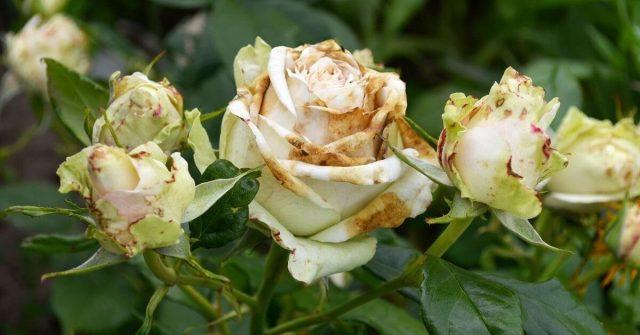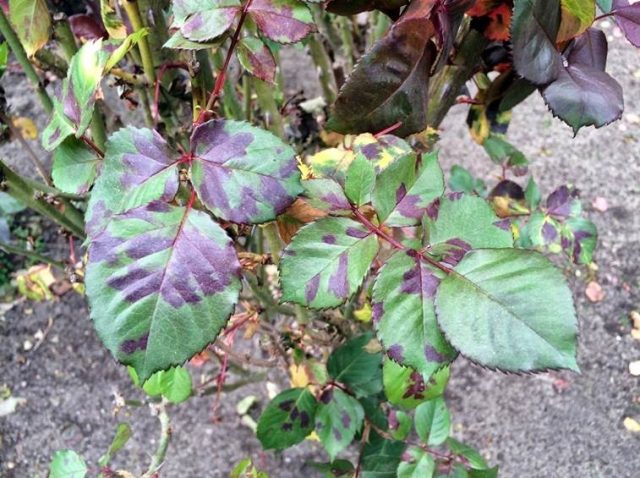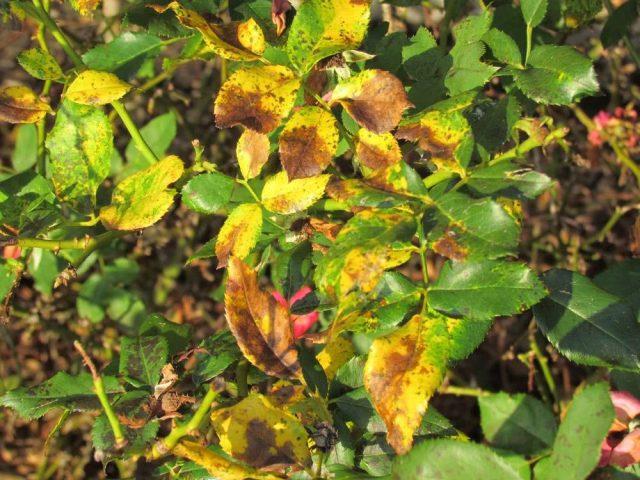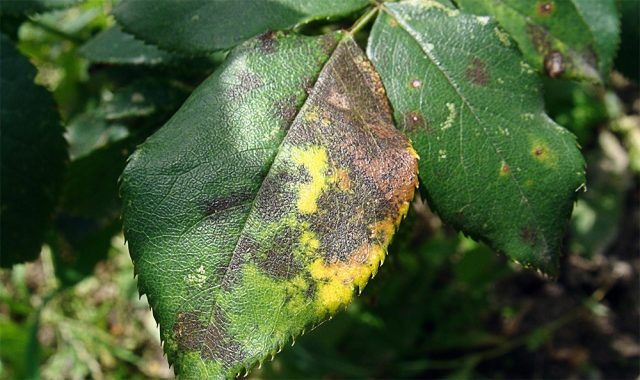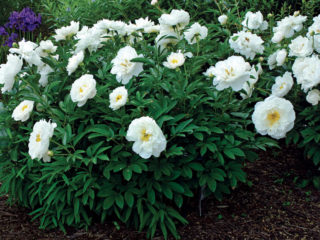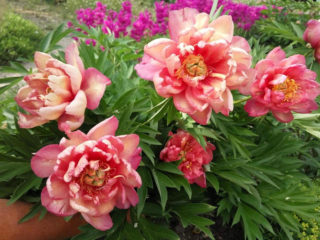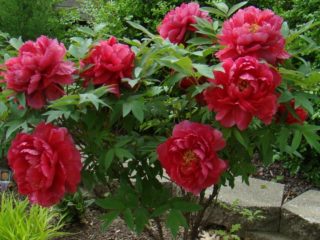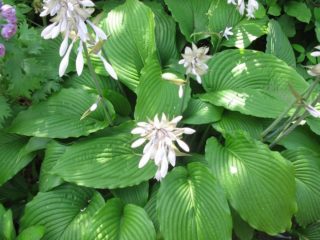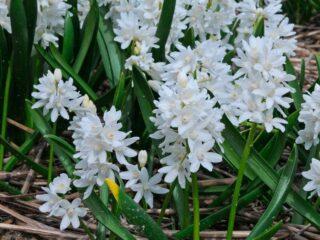Content
The leaves of the rose are falling off - a problem that gardeners who grow this beautiful ornamental plant on their plots often encounter. Sometimes the falling of leaf blades is a natural process, but most often this sign indicates errors in the organization of care or the development of a crop disease.
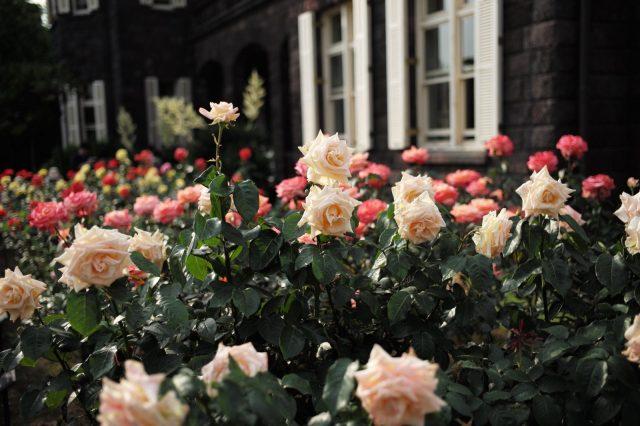
If a rose's leaves fall off, it is important to identify the cause in time and eliminate it as soon as possible
The rose has dropped its leaves: what is the reason
If in the summer the leaves of a rose in the garden begin to fall, you need to carefully examine the bush and try to determine the causes of the phenomenon. There can be quite a lot of them, but, as a rule, most often these are unsuitable conditions or poor quality care. The plant is considered heat-loving, so its leaves usually fall off due to improper placement, for example, in a draft. In a shaded area with a lack of sunlight, the lower leaves of the rose will begin to fall off. Premature leaf fall also occurs due to bright sun, improper organization of watering, and low immunity.Also, leaves fall off in dry air during hot summers.
sunlight
Another reason why tea rose leaves fall is bright sunlight. The culture prefers to grow in a flowerbed with diffused lighting, and the scorching sun is destructive to its delicate above-ground part. High temperatures usually cause the leaf blades to burn, causing them to fall off.
Improper watering
Suddenly, the green mass of the rose begins to crumble if the watering rules are violated. Trouble occurs if the water is too cold or hot, in case the humidification is untimely.
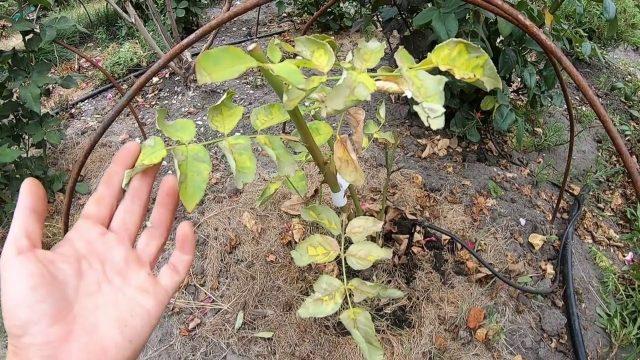
Rose does not grow well in areas with close contact with groundwater
Nutritional deficiencies
A deficiency of nutrients results from a slowdown in the growth of the rose and leads to the leaves falling off, and the plant begins to be susceptible to various diseases and pests. The general condition of the crop noticeably deteriorates due to vitamin deficiency, the leaf blades become pale, small, begin to dry, buds do not set, or their number is noticeably reduced.Thus, the yellowness of the leaves indicates a lack of iron, if they fall off en masse, this signals a deficiency of potassium, the appearance of a red tint on the plates and a change in the color of the shoots means a lack of phosphorus, white tips on the foliage are considered an indicator of an insufficient amount of copper, and colorless spots appear on it due to a lack of magnesium.
Diseases
Among the diseases that cause rose leaves to fall off are:
- Botrytis. It can be recognized by the appearance of brown spots with a gray coating on the green mass. Gradually the plant dries, the leaves curl and fall to the ground. The buds turn black before they have time to open.
Botrytis occurs due to cold, high humidity, excess nitrogen and dense plantings
- Powdery mildew. When it occurs, the leaf plates curl and a gray coating appears on them.
Powdery mildew progresses in hot weather, high humidity, dry soil and calcium deficiency
- Perenosporosis. It is characterized by red spots and a silvery coating on the inside of the leaves, which crumble over time.
Perenosporosis occurs as a result of waterlogging, as well as during a hot or damp period
- Rust. Causes the appearance of rusty spots on the green mass of the plant; if not treated in a timely manner, the leaves turn black and fall off.
Rust appears in cold spring and with a lack of potassium.
- Black spot. Can be recognized by brown spots with yellow edging. The disease appears at high humidity and lack of potassium, causing massive leaf fall.
If black spot is detected, roses should be treated with fungicides or insecticides as soon as possible.
Pests
If a cobweb appears on the rose and the leaves begin to fall off, then you should inspect the bush for the presence of parasites. If not properly cared for, the crop is often attacked by spider mites, roseate scale insects, and aphids. Also, the plant is not immune to attacks by thrips, slobbering pennies, cicadas, and gall moths.
Why does a rose shed its leaves during flowering?
During flowering in summer, roses shed their leaves most often due to sudden cold weather or drought, micronutrient deficiency, insufficient or excessive moisture. Also, it is at the height of budding that the crop becomes most attractive to pests. And if a rose has shed its leaves in August, then this may already indicate that it is gradually beginning to prepare for winter.
What to do if the leaves of a rose fall off
If the roses have lost all or part of their leaves, you can save them by resorting to different protection measures, which are chosen depending on the source of the problem. In the case when the green mass crumbles due to violations of the rules for moistening the soil, the irrigation technique should be changed. It is recommended to carry it out only with warm and settled water in accordance with weather conditions and the dryness of the top layer of the earth. Considering the fact that it is better to underfill than to overfill.
If a flower bed with rose bushes is constantly exposed to direct sunlight, then their leaves will fall off, most likely due to burns. In this case, the plants should be shaded or transplanted to an area with more favorable conditions.
If there is a shortage of useful elements, it is recommended to fertilize roses with special means. The use of dry or liquid fertilizers is allowed. You can use them as:
- wood ash;
- superphosphates;
- vermicompost;
- ammonium nitrate;
- potassium sulfate;
- potassium magnesia.
In the fight against pests that cause rose leaves to fall off, drugs such as Alatar, Iskra-M, Zubra, Fufanona, and Tanrek are very helpful. And iron sulfate, Fitosporin, Bordeaux mixture saves from diseases.
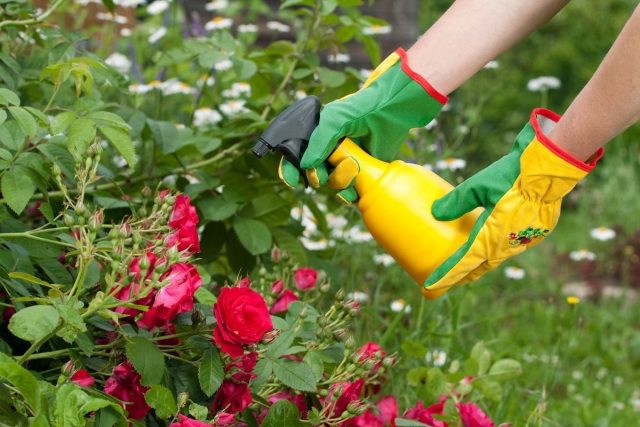
When treating rose gardens with chemicals, you should follow all recommendations.
Preventive measures
Compliance with preventive measures helps to avoid major problems or eliminate them at the initial stage of development. Therefore, when growing crops, gardeners strongly recommend the following actions:
- Organize high-quality and timely care of plantings.
- Remove debris from the site, remove weeds, collect all leaves that fall off.
- Periodically trim bushes with disinfected tools. Remove and then burn all old and damaged shoots and wilted buds.
- Conduct a visual inspection of your rose bushes weekly to catch the problem at its very beginning.
- If symptoms of the disease are detected, diseased areas should be pruned and the plants should be sprayed with any fungicidal preparations.
- When growing roses in a greenhouse, be sure to ventilate them and avoid thickening the plantings.
- To prevent the appearance of pests, carefully wash the above-ground parts of the plants with strong pressure of water or a soap solution (4 tablespoons of laundry soap shavings per 1 liter of liquid).
- Mulch the tree trunks of bushes with sawdust, tree bark or coconut fiber.
- Plant strong-smelling protective plants near the rose garden: sage, lavender, calendula, coriander, onion, garlic.
- Attract birds, frogs, and insects to the site.
Conclusion
Rose leaves fall off for various reasons: improper organization of care, disease, pest attack, non-compliance with growing conditions. Rarely, premature leaf fall can occur due to natural processes. When an unpleasant phenomenon is detected, the goal of the grower should be to determine its source and further eliminate it. If this rule is neglected, the rose will lose its decorative effect, and sometimes may even die.
